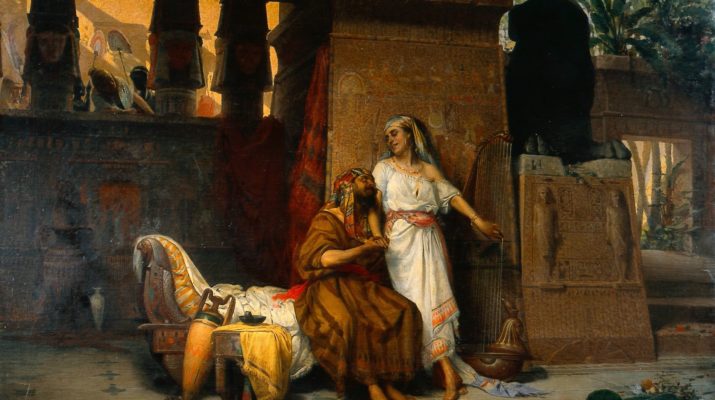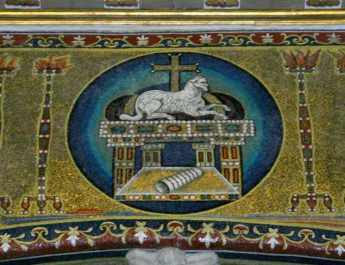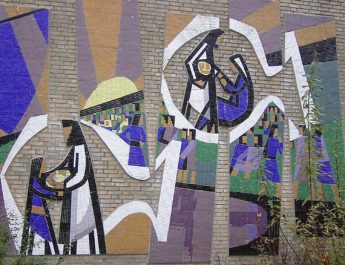Genesis 12
BibleHub
1 Now the LordA said to Abram,B “GoC from your countryD
Notes on verse 1a
A “Lord” = YHVH. From havah (to be, become) or hayah (to come to pass, become, be). This is the name of the God of Israel, the self-existent and eternal one, the tetragrammaton. This pronunciation has been lost to time so “Lord” is generally used in its place.
B “Abram” = Abram. From the same as Abiram (exalted father, a high father – lofty) {from ab (father literal or figurative) + rum (rise, bring up, being high, extol, exalt, haughty; to raise in a literal or figurative sense)}. This is Abram, exalted father.
C “go” = halak. This is go, come, walk. It is walk literally and figuratively and includes people and animals. It can be used figuratively for one’s moral life – how we walk according to God’s way or against it. It can also refer to the walk of life as in the course one’s life takes, the choices we make, etc.
D “country” = erets. Root may mean to be firm. This is earth, ground, field land, or country.
and your kindredE and your father’sF houseG to the landH that I will showI you.
Notes on verse 1b
E “kindred” = moledet. From yalad (to bear, bring forth, beget, calve, act as midwife, show lineage). This is kindred, offspring, birthplace, lineage, native country, or family.
F “father’s” = ab. Related to “Abram” in v1. See note B above.
G “house” = bayit. Probably from banah (to build, make, set up, obtain children; to build literally or figuratively). This is house, court, family, palace, temple.
H “land” = erets. Same as “country” in v1. See note D above.
I “show” = raah. This is to see in a literal or figurative sense so stare, advise, think, view.
2 I will makeJ of you a greatK nation,L and I will blessM you,
Notes on verse 2a
J “make” = asah. This is to make, do, act, appoint, become in many senses.
K “great” = gadol. From gadal (to grow up, become great, become wealthy – to advance. The root meaning may be to twist in the sense of the process of growing). This is great, high, bigger, noble, old, marvelous. It can also refer to someone who is powerful or distinguished.
L “nation” = goy. From the same root as gevah (the back, person, or body); related to gev (among); related to gaah (to rise up). This is nation or people. Often used to refer to Gentiles or foreign nations. It can also be used figuratively for a group of animals. This is where the Yiddish “goy” comes from.
M “bless” = barak. This is to kneel, to bless. It is blessing God as part of worship and adoration or blessing humans to help them. It can be used as a euphemism to say curse God.
and make your nameN great,O so that you will beP a blessing.Q
Notes on verse 2b
N “name” = shem. May be from sum (to put, place, set). This is name, fame, renown. A name was thought to indicate something essential about a person – something about their individuality. So, this word can also mean honor, authority, or character.
O “make…great” = gadal. Related to “great” in v2. See note K above.
P “be” = hayah. This is to be or become, to happen.
Q “blessing” = barakah. Related to “bless” in v2. From barak (see note M above). This is blessing, which implies prosperity or peace.
3 I will bless those who bless you, and the one who cursesR you I will curse;S and in you all the familiesT of the earthU shall be blessed.”
Notes on verse 3
R “curses” = qalal. This is to be little, insignificant, swift. It can also mean to bring down in esteem, create contempt, curse
S “curse” = arar. This is to curse.
T “families” = mishpachah. From the same as shiphcah (maid, maidservant); root means to spread out. This is one’s circle of relatives – clan, family, kindred.
U “earth” = adamah. From the same as adam (man, humankind); perhaps from ‘adom (to be red). This is ground, earth, soil as red, or land.
4 So Abram went, as the Lord had toldV him; and LotW went with him. Abram was seventyX-five years oldY when he departedZ from Haran.AA
Notes on verse 4
V “told” = dabar.From dabar (to speak, declare, discuss). This is speech, a word, a matter, an affair, charge, command, message, promise, purpose, report, request. It is a word, which implies things that are spoken of in a wide sense.
W “Lot” = Lot. From the same as lot (envelope, veil); from lut(to wrap, envelop). This is Lot, “covering.”
X “seventy” = shibim. From sheba (seven – the number of perfection/sacred fullness). This is seventy.
Y “old” = ben. Related to “house” in v1. Perhaps from banah (see note G above). This is son, age, child. It is son in a literal or figurative sense.
Z “departed” = yatsa. This is to go or come out, bring forth, appear. It is to go out in a literal or figurative sense.
AA “Haran” = Charan. 12x in OT. From Assyrian arranu (road, crossroads, junction of trade routes) OR from charar (to be scorched, burn, glow, dry up; figuratively, to show passion). This is Haran, meaning crossroads. It is also a proper name meaning parched.
5 Abram took his wifeBB SaraiCC and his brother’sDD sonEE Lot,
Notes on verse 5a
BB “wife” = ishshah. From ish (man); perhaps from enosh (human, humankind, mortal); from anash (to be weak, sick, or frail). This is woman, wife, or female.
CC “Sarai” = Saray. 17x in OT. From the same as sar (chief, ruler, lord, official, governor, prince; someone at the top of a rank or class). This is Sarai, which means princess or ruler.
DD “brother’s” = ach. This is brother, kindred, another, other, like. It is literally brother, but it can also be someone who is similar, resembling, or related to.
EE “son” = ben. Same as “old” in v4. See note Y above.
and all the possessionsFF that they had gathered,GG and the personsHH whom they had acquiredII in Haran;
Notes on verse 5b
FF “possessions” = rekush. From rakash (to get, acquire property, collect). This is property, riches, possessions.
GG “gathered” = rakash. Related to “possessions” in v5. 5x in OT. See note FF above.
HH “persons” = nephesh. Related to naphash (to refresh or be refreshed). This is soul, self, person, emotion. It is a breathing creature. Can also refer to appetites and desires.
II “acquired” = asah. Same as “make” in v2. See note J above.
and they set forthJJ to go to the land of Canaan.KK When they had comeLL to the land of Canaan,
Notes on verse 5c
JJ “set forth” = yatsa. Same as “departed” in v4. See note Z above.
KK “Canaan” = Kna’an. From kana’ (to be humble, subdue; properly, bend the knee). This is Canaan, his descendants, and the land where they settled. This could mean lowlands, describing their land or subjugated in reference to being conquered by Egypt. See https://en.wikipedia.org/wiki/Canaan
LL “come” = bo. This is to enter, come in, advance, fulfill, bring offerings, enter to worship, attack. It can also have a sexual connotation.
6 Abram passed throughMM the land to the placeNN at Shechem,OO to the oakPP of Moreh.QQ At that time the CanaanitesRR were in the land.
Notes on verse 6
MM “passed through” = abar. This is to pass over or cross over. It is used for transitions, whether literal or figurative. It can also mean to escape, alienate, or fail. This is the root verb from which “Hebrew” is drawn.
NN “place” = maqom. From qum(to arise, stand, accomplish, establish, abide; rising against, getting up after being sick or asleep, arising from one state to another, becoming powerful, or rising for action; standing in a figurative sense). This is a standing, which is to say a spot or space a place. It can also refer to a locality or a physical/mental condition. HaMaqom is also a Jewish name for God – the place, i.e. the Omnipresent One.
OO “Shechem” = Shekem. From the same as shekem (shoulder, neck, or some other place that bears burdens; figuratively, the spur of a hill, or one’s allotted portion); from shakam (to rise early, begin work early; properly, this is leaning one’s shoulder or back into a load or a burden; also, loading an animal for work). This is Shechem, meaning “ridge.”
PP “oak” = elon. 10x in OT. From ayil (strength; things that are strong or powerful: political chiefs, rams, posts, trees, oaks); from the same as ul (mighty, strength, body, belly; root may mean to twist and that implies strength and power). This is terebinth, oak, or another kind of tree that is strong.
QQ “Moreh” = Moreh. 3x in OT. From the same as moreh (early rain, teacher, what is taught, archer); from yarah (to throw, shoot, be stunned; to flow as water so figuratively to instruct or teach). This is Moreh, a hill in Canaan, perhaps named for a Canaanite. It means “early rain” or “teacher.” See https://www.abarim-publications.com/Meaning/Moreh.html
RR “Canaanites” = Knaaniy. Related to “Canaan” in v5. From Kna’an (see note KK above). This is Canaanite, which in some instances would imply a peddler or sometimes used in place of Ishmaelite. See https://en.wikipedia.org/wiki/Canaan
7 Then the Lord appearedSS to Abram, and said, “To your offspringTT I will give this land.” So he builtUU there an altarVV to the Lord, who had appeared to him.
Notes on verse 7
SS “appeared” = raah. Same as “show” in v1. See note I above.
TT “offspring” = zera. From zara (to sow or scatter seed; conceive or yield). This is seed or sowing. It can, thus, mean a fruit, plant, sowing time, child, offspring, or posterity.
UU “built” = banah. Related to “house” in v1 & “old” in v4. See note G above.
VV “altar” = mizbeach. From zabach (to kill, slay, offer; slaughtering an animal to offer as a sacrifice). This is an altar.
8 From there he movedWW on to the hill country on the eastXX of Bethel,YY and pitchedZZ his tent,AAA
Notes on verse 8a
WW “moved” = atheq. 9x in OT. This is to move, advance, remove or continue. Figuratively, it can mean to grow old or it could refer to copying or transcribing.
XX “east” = qedem. Perhaps from qadam (to come in front or be in front; to meet, anticipate, confront, receive, or rise; sometimes to meet for help). This is front, formerly, before, east, eternal, everlasting, antiquity.
YY “Bethel” = Bethel. Related to “house” in v1. From bayit (see note G above) + el (God, a god). This is Bethel, literally meaning “house of God.”
ZZ “pitched” = natah. This is to stretch or spread out, to extend, or bend. In can also imply moral deflection.
AAA “tent” = ohel. Perhaps from ahal (to shine, be clear). This is a tent, covering, home, or side pillar.
with Bethel on the westBBB and AiCCC on the east; and there he built an altar to the Lord and invokedDDD the name of the Lord. 9 And Abram journeyedEEE on by stagesFFF toward the Negeb.GGG
Notes on verses 8b-9
BBB “west” = yam. Root may mean to roar. This is the sea, often referring to the Mediterranean. It comes from the root in the sense of the roar of crashing surf. This word is sometimes used for rivers or other sources of water. It can mean to the west or to the south.
CCC “Ai” = Ay. Perhaps from iy (a ruin or a heap as a place that was overturned); from avah (to bend, twist, be amiss). This is Ai, a city in Canaan. It means “ruin.”
DDD “invoked” = qara. This is to call or call out – to call someone by name. Also used more broadly for calling forth.
EEE “journeyed” = nasa. This is properly pulling up as when one pulls up tent pegs or stakes. This would imply striking tents in order to start a journey. So this could be bring, pullout, set out, journey, or cause to go away.
FFF “by stages” = halak + nasa. Halak is the same as “go” in v1. See note C above. Nasa is the same as “journeyed” in v9. See note EEE above. Nasa is Infinitive Absolute. The Infinitive Absolute serves to emphasize the sentiment of the word. It is rather like Foghorn Leghorn’s speech pattern, “I said, I said.”
GGG “Negeb” = Negeb. Root may mean to be parched. The Negeb is the south country – sometimes used to refer to Egypt. This is a land that suffers from a lot of drought.
10 Now there was a famineHHH in the land. So Abram went downIII to EgyptJJJ to reside there as an alien,KKK for the famine was severeLLL in the land.
Notes on verse 10
HHH “famine” = raab. From raeb (to be hungry). This is hunger, death, or hunger from famine.
III “went down” = yarad. This is to go down, descend; going down in a literal or figurative sense. It can be going to the shore or a boundary, bringing down an enemy.
JJJ “Egypt” = Mitsrayim. Perhaps from matsor (besieged or fortified place, bulwark, entrenchment; something hemmed in; a siege or distress or fastness); from tsur (to confine, besiege, to cramp). This is Egypt.
KKK “reside…as an alien” = gur. Properly, this is the act of turning off the road for any reason. So, it means sojourning, becoming a guest. It can mean being fearful since one is outside of home territory. It can also mean dwelling, living, or inhabiting if one has turned off the root to encamp for a longer duration. This word is where the Hebrew “ger” comes from, which is the word translated “stranger” or “resident alien.”
LLL “severe” = kabed. From kabad (to be heavy, weighty, burdensome). This is heavy, grievous, sore. It can also be weighty in the sense of gravitas. The word for “glory” in Hebrew comes from this root (kabod).
11 When he was about toMMM enterNNN Egypt, he said to his wife Sarai, “OOOI knowPPP well that you are a womanQQQ beautifulRRR in appearance;SSS
Notes on verse 11
MMM “about to” = qarab. This is to come near, offer, make ready, approach, take.
NNN “enter” = bo. Same as “come” in v5. See note LL above.
OOO {untranslated} = hinneh + na. Hinneh is from hen (lo! Behold! If, though; an expression of surprise). This is to draw attention, show suddenness or surprise, or to emphasize the importance of the coming statement. See! Lo! Behold! Na is used for requests or for urging. It can be we pray, now, I ask you, oh. This is the same “na” in “hosanna.”
PPP “know” = yada. This is to know, acknowledge, advise, answer, be aware, be acquainted with. Properly, this is to figure something out by seeing. It includes ideas of observation, recognition, and care about something. It can be used causatively for instruction, designation, and punishment.
QQQ “woman” = ishshah. Same as “wife” in v5. See note BB above.
RRR “beautiful” = yapheh. From yaphah (to be beautiful, decorate; root means being bright, which implies being beautiful). This is beautiful in a literal or figurative sense – appropriate, handsome, godly, pleasant.
SSS “appearance” = mareh. Related to “show” in v1. From raah (see note I above). This is sight, appearance, or vision. It can be a view, seeing itself, that which is seen, something real, or a vision one sees
12 and when the EgyptiansTTT see you, they will say, ‘This is his wife’; then they will killUUU me, but they will let you live.VVV
Notes on verse 12
TTT “Egyptians” = Mitsri. Related to “Egypt” in v10. From the same as Mitsrayim (see note JJJ above). This is Egyptian.
UUU “kill” = harag. This is to strike with deadly intent so it can be kill, destroy, murder, or put to death.
VVV “let…live” = chayah. This is to live or keep alive in a literal or figurative sense. So, it an be revive, nourish, or save.
13 SayWWW you are my sister,XXX so that it may go wellYYY with me because of you, and that my lifeZZZ may be sparedAAAA on your account.”
Notes on verse 13
WWW {untranslated} = na. Same as {untranslated} in v11. See note OOO above.
XXX “sister” = achot. Related to “brother’s” in v5. From the same as ach (see note DD above). This is sister in a literal or figurative sense. It can also mean another or together.
YYY “go well” = yatab. This is to be good or pleasing, joyful. It can also mean doing good in an ethical sense or be beautiful, happy, successful, or right.
ZZZ “life” = nephesh. Same as “persons” in v5. See note HH above.
AAAA “be spared” = chayah. Same as “let…live” in v5. See note VVV above.
14 When Abram entered Egypt the Egyptians saw that the woman was very beautiful. 15 When the officialsBBBB of PharaohCCCC saw her, they praisedDDDD her to Pharaoh. And the woman was taken into Pharaoh’s house.
Notes on verses 14-15
BBBB “officials” = sar. Related to “Sarai” in v5. See note CC above.
CCCC “Pharaoh” = Paroh. From Egyptian pr (palace, pharaoh; literally house + great). This is Pharaoh, a title for Egyptian kings. See https://en.wiktionary.org/wiki/pharaoh
DDDD “praised” = halal. This is to be clear – it originally referred to a sound, then a color. It was to shine and then make a show or boast then to rave. In a causative sense it came to mean celebrate, give glory, sing praise, or be worth of praise. Because of the celebratory nature of the word, it could also mean to give in marriage. This is where Hallelujah comes from.
16 And for her sake he dealt wellEEEE with Abram; and he had sheep,FFFF oxen,GGGG male donkeys,HHHH
Notes on verse 16a
EEEE “dealt well” = yatab. Same as “go well” in v13. See note YYY above.
FFFF “sheep” = tson. This is a flock of sheep and goats.
GGGG “oxen” = baqar. From baqar (to plow, break forth; figuratively, to inquire, inspect, consider). This is cattle – an animal used for plowing.
HHHH “male donkeys” = chamor. From chamar (to be red, blush). This is a male donkey.
maleIIII and female slaves,JJJJ female donkeys,KKKK and camels.LLLL
Notes on verse 16b
IIII “male” = ebed. From abad (to work, serve, compel; any kind of work; used causatively, can mean to enslave or keep in bondage). This is a servant, slave, or bondservant.
JJJJ “female slaves” = shiphchah. Root may mean to spread out – it would be the same root used in mishpachah, which means family or clan. This is maidservant, female slave, or female bondslave.
KKKK “female donkeys” = athon. Perhaps from the same as eythan (continual, mighty, strong, ever-flowing, permanence). This is a female donkey as an animal that is patient and gentle.
LLLL “camels” = gamal. From gamal (how one deals with someone whether positively or negatively – so to reward, requite; to wean or the work that goes into something ripening). This is a camel as an animal of labor or one that bears burdens. The English word “camel” is from a Semitic source, perhaps Hebrew or others.
17 But the Lord afflictedMMMM Pharaoh and his house with great plaguesNNNN because ofOOOO Sarai, Abram’s wife.
Notes on verse 17
MMMM “afflicted” = naga. This is touch, reach, arrive, come near, strike. This is touching for any reason including sexual or violent.
NNNN “plagues” = nega. Related to “afflicted” in v17. From naga (see note MMMM above). This is a blow or stroke, wound, sore, mark plague. It can refer to someone with leprosy or to dress.
OOOO “because of” = al + dabar. Literally “upon the matter of.” Dabar is the same as “told” in v4. See note V above.
18 So Pharaoh calledPPPP Abram, and said, “What is this you have doneQQQQ to me? Why did you not tellRRRR me that she was your wife? 19 Why did you say, ‘She is my sister,’ so that I took her for my wife? Now then, hereSSSS is your wife, take her, and be gone.”TTTT
Notes on verses 18-19
PPPP “called” = qara. Same as “invoked” in v8. See note DDD above.
QQQQ “done” = asah. Same as “make” in v2. See note J above.
RRRR “tell” = nagad. This is to declare, make conspicuous, stand in front, manifest, predict, explain.
SSSS “here” = hinneh. Same as {untranslated} in v11. See note OOO above.
TTTT “be gone” = halak. Same as “go” in v1. See note C above.
20 And Pharaoh gave his menUUUU ordersVVVV concerning him; and they set him on the way,WWWW with his wife and all that he had.
Notes on verse 20
UUUU “men” = ish. Related to “wife” in v5. See note BB above.
VVVV “gave…orders” = tsavah. This is to charge, command, order, appoint, or enjoin. This is the root that the Hebrew word for “commandment” comes from (mitsvah).
WWWW “set…on the way” = shalach. This is to send out, away, send for, forsake. It can also mean to divorce or set a slave free.
Image credit: “Abraham and Sarah in the Pharaoh’s Palace” by Giovanni Muzzioli, 1875.




